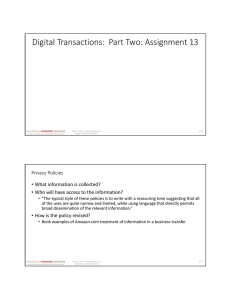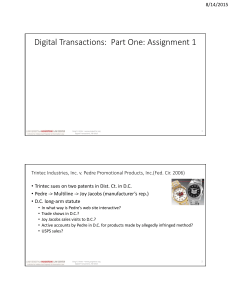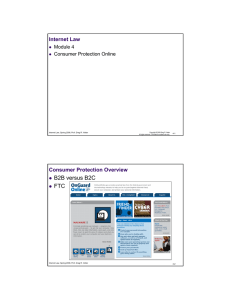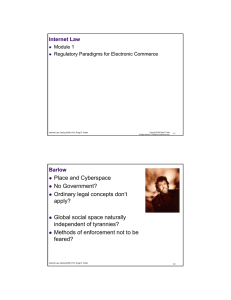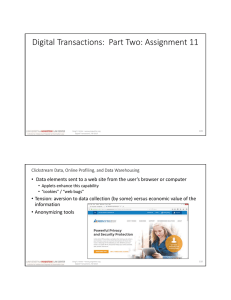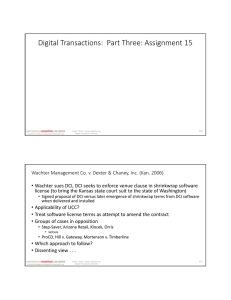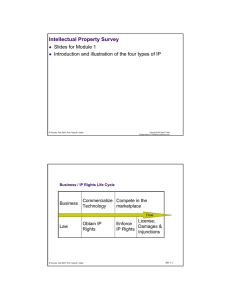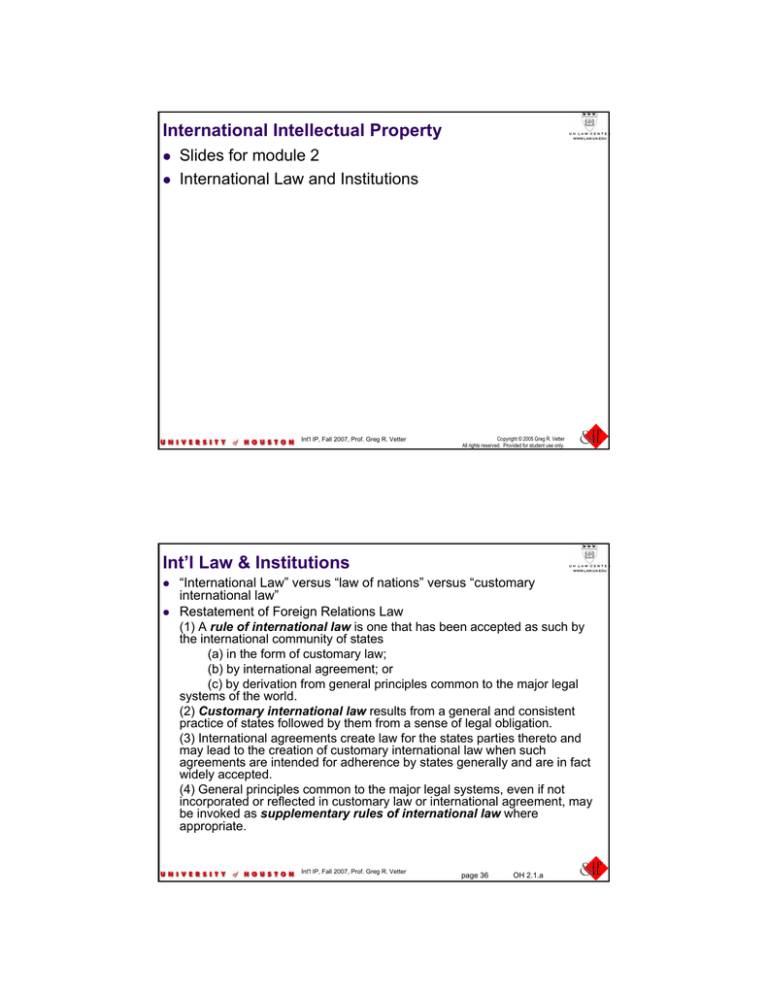
International Intellectual Property
z
z
Slides for module 2
International Law and Institutions
Int'l IP, Fall 2007, Prof. Greg R. Vetter
Copyright © 2005 Greg R. Vetter
All rights reserved. Provided for student use only.
Int’l Law & Institutions
z
z
“International Law” versus “law of nations” versus “customary
international law”
Restatement of Foreign Relations Law
(1) A rule of international law is one that has been accepted as such by
the international community of states
(a) in the form of customary law;
(b) by international agreement; or
(c) by derivation from general principles common to the major legal
systems of the world.
(2) Customary international law results from a general and consistent
practice of states followed by them from a sense of legal obligation.
(3) International agreements create law for the states parties thereto and
may lead to the creation of customary international law when such
agreements are intended for adherence by states generally and are in fact
widely accepted.
(4) General principles common to the major legal systems, even if not
incorporated or reflected in customary law or international agreement, may
be invoked as supplementary rules of international law where
appropriate.
Int'l IP, Fall 2007, Prof. Greg R. Vetter
page 36
OH 2.1.a
Restatement of Foreign Relations §102
z
Practice as customary law (Type 2:
RS §102(1)(a) & §102(2))
Duration? How widespread? Effect of declared dissent?
Opinio juris
z For practice to become customary law, states must follow it from a
sense of legal obligation
Dissenting views and new states
General and special custom
z
z
z
z
z
Peremptory norms – jus cogens (Type 4:
z permitting no derogation
z
Conflict between int’l agreement and customary law
z equal authority as int’l law, unless customary law is jus
cogens
Int'l IP, Fall 2007, Prof. Greg R. Vetter
RS §102, comment k)
pages 36-38
OH 2.1.b
Restatement of Foreign Relations §102
z
Int’l agreements as a source of law (Type 1:
RS §102(1)(b))
multilateral agreements open to all states are increasingly used for
general legislation, or to codify developing customary law
Bindings resolutions of international organizations
Int’l agreements codifying or contributing to customary law
z Some multinational agreements may come to be law for
non-parties that do not actively dissent
z
z
z
z
General principles as a secondary
source of law (Type 3: RS §102(1)(c) & §102(4))
Int'l IP, Fall 2007, Prof. Greg R. Vetter
pages 36-38
OH 2.1.c
Vienna Convention on the Law of Treaties
z
z
z
Article 26 – performed in good faith
Article 27 – don’t invoke internal law as justification for
failure to perform a treaty
Article 31 – interpretative rules
z
z
z
z
Ordinary meaning of terms in light of object and purpose
Context for interpretation includes preambles, annexes, and other
agreements/instruments under certain conditions in connection
with the conclusion of the treaty
In addition to context, interpretative meaning comes from
subsequent
z Agreement on interpretation
z Practice in application
z Relevant rules of int’l law applicable to the parties’ relation
Article 32 – supplementary means of interpretation
(preparatory work & circumstances) to be used when
under Article 31 the meaning is
z
z
ambiguous, obscure
manifestly absurd or unreasonable
Int'l IP, Fall 2007, Prof. Greg R. Vetter
pages 40-41
OH 2.2
Another way to think about the basis of Int’l law
(vastly oversimplified, but hopefully illustrative)
State consent
explicit
implicit
treaties
customary law
jus cogens
general principles
Int'l IP, Fall 2007, Prof. Greg R. Vetter
OH 2.3
Multilateral Agreements – Int’l IP Instruments
z
Multilateral Agreements replacing bilateral
agreements
z
z
Joining a treaty
z
z
Administering a treaty
Process of updating multilateral agreements via
“Acts”
z
z
z
Why?
Creation of different requirements to which states have
agreed to be bound
Effect of TRIPS on this?
Influences driving multilateral treaty membership
z
z
Balance of trade considerations
“Most Favored Nation” status
Int'l IP, Fall 2007, Prof. Greg R. Vetter
pages 41-43
OH 2.4
Leading Institutions & Actors
z
z
WIPO: Paris & Berne and many others
z Mission: “promoting the protection of [IP] . . . through cooperation among
states . . .”
z Specialized agency of UN
z drafting, discussion, revision and conclusion of new IP treaties, and less
formal norm building
WTO: TRIPS
z TRIPS agreement is an annex to the agreement establishing WTO
z GATT (Uruguay) -> WTO -> TRIPS
z “non-IP related incentives for certain states to join the community of IP
respecting nations”
z WTO dispute resolution system
z TRIPS Council
z
z
Operate TRIPS agreement
Monitoring compliance
Members can raise an issue of another member’s compliance
Systemic review of member’s implementing legislation, obligation to “notify” (Art.
63.2) of implementing law to facilitate review (avoids some formal dispute resolution,
beneficial ex ante effects, identifies deficiencies and differences in interpretation)
Int'l IP, Fall 2007, Prof. Greg R. Vetter
pages 44-47
OH 2.5
EU
z
z
z
z
Growing importance as a player in Int’l IP debate
and implementation
Future growth of EU
Influence on member states and multinational
organizations
Directives
z
z
z
Drive harmonization effort within EU
Influence debate elsewhere (database directive)
Echoed in other countries systems (CTEA)
z
Commentator on this “echo” effect in US:
Congress needs to investigate to “free US innovation law from the
grip of unelected [captured?] foreign bureaucrats . . . ”
Int'l IP, Fall 2007, Prof. Greg R. Vetter
pages 47-48
OH 2.10.a
EU Review
ECJ
z
z
z
z
Advantages – the main
advantages of the EU are
seen as...
A huge market of nearly 400
million people in which
companies are able to sell
their goods and services
without restrictions.
Freedom for citizens of the
member states to move freely
within the EU and to get jobs
in other member countries.
A wide choice of goods and
services for EU citizens,
which are often cheaper
because of competitive
markets.
AG
CFI
z
z
z
z
Disadvantages – against this, some people in member
countries think ...
EU institutions have too much power. They have taken
away the right of individual countries to make their own
decisions about economic and political matters.
The EU is undemocratic, because decisions are taken a
long way from the people; people who are affected by
decisions have little chance to make their voices heard.
There are too many rules and regulations, some of which
aren't sensible.
Int'l IP, Fall 2007, Prof. Greg R. Vetter
OH 2.10.b
EU - Commission
z
z
z
z
z
Administrative
branch of EU
Propose
legislation
Appointed, 20
members
Divided into
“directoratesgeneral”
Two are
particularly
relevant for
Int’l IP
Int'l IP, Fall 2007, Prof. Greg R. Vetter
pages 49
OH 2.10.c
EU – Other Institutions & Items
z
Council(s)
z
z
z
Parliament
z
z
Sits in France, not Brussels
Legislative Instruments
z
z
z
Membership depends on subject matter
Twenty-five subject matter areas
z IP dealt with by the Internal Market Council
Regulation (federal law of Europe)
Directive
z Binding in result to be achieved
z Requires “transposition”
Legislative Process
z
z
http://www.uc.pt/CDEUC/CDEUC19.HTM
(this web address contains links to the
flowcharts on the next two slides)
Consultation Procedure
Codecision (joint legislative) Procedure
Int'l IP, Fall 2007, Prof. Greg R. Vetter
pages 49-51
OH 2.10.d
EU Review –
Codecision procedure
Int'l IP, Fall 2007, Prof. Greg R. Vetter
OH 2.10.e
EU Review –
consultation
procedure
Int'l IP, Fall 2007, Prof. Greg R. Vetter
OH 2.10.f
EU – Judicial Process
z
EJC
z
z
z
No stare decisis
z
z
Jurisprudence constante for uniformity in the application of the law
Important jurisdiction for IP
z
z
z
CFI
Advocates-general
z Opinion in advance of court decision
Enforcement actions
Preliminary Reference Procedure
z Analogous to “certifying” a state law question from federal court to
a state supreme court
Relationship w/ national law of member states
z
z
z
Early jurisprudence suspicious of broad IP rights because the
hindered free movement of goods among member states
Strictly speaking, jurisprudence arises from conflict of “supreme”
Community law and national implementation
Increasing case load to assist national courts in implementing
directives
Int'l IP, Fall 2007, Prof. Greg R. Vetter
pages 51-53
OH 2.10.g
Other Players
z
UNESCO
z
z
OECD
z
z
Administers the Universal Copyright Convention
As to IP, primarily focused on e-commerce
Hague Conference on Private Int’l Law
z
draft convention on enforcement of foreign judgments
contains provisions targeted particularly at Int’l IP
litigation
Int'l IP, Fall 2007, Prof. Greg R. Vetter
pages 55-57
OH 2.11
Negotiation of Treaties
z
WIPO
z
Treaty subject matter “peculates” at WIPO
z
z
z
z
z
z
Private sector role via NGO participation
WTO
z
z
Standing committees of experts for three areas of IP
IP agreements part of general “round” of trade talks
No NGOs, documents cloistered
Effect of treaties on Int’l IP?
How does Int’l IP lawmaking process differ within
each institution?
Role of national law?
Int'l IP, Fall 2007, Prof. Greg R. Vetter
pages 57-60
OH 2.12
Treaties Under US Law
z
Int’l meaning of “treaty”
z any “international agreement concluded between two States in written
form and governed by international law”
z From Report to Senate Committee:
z
z
z
z
z
(1) The parties intend the agreement to be legally binding and the agreement
is subject to international law;
(2) The agreement deals with significant matters;
(3) The agreement clearly and specifically describes the legal obligations of
the parties; and
(4) The form indicates an intention to conclude a treaty, although the
substance of the agreement rather than the form is the governing factor.
US law meaning of “treaty”
z one kind of international agreement that becomes law within the US
because it is an agreement that is made “by and with the advice and
consent of the Senate”
z Self-executing or not?
z
z
z
Sometimes not clear on the face of the treaty
An interpretation issue for executive branch or courts
If self-executing, supremacy clause means that it overrides state law
Int'l IP, Fall 2007, Prof. Greg R. Vetter
pages 61-66
OH 2.13.a
Executive Agreements
z
Three types:
z Congressional – Executive Agreements
z
Agreements pursuant to treaties
z
Presidential or Sole Executive Agreements
z
z
z
z
z
z
z
Explicitly or implicitly authorized by Congress, or submitted to it for approval
z
Express authorization or reasonably inferred
Five areas (pg. 63): (i) general executive authority; commander in chief; treaty
clause for agreements that are part of negotiating a treaty; authority to receive
ambassadors; duty to “take care” that the laws are faithfully executed
Executive agreements in the President’s independent constitutional authority
can supersede conflicting state law
Opinions differ as to superceding a prior act of Congress
Increasing use
z In 1980s, US entered into 300-400 Executive Agreements per year as
opposed to 8-26 treaties
Trade Agreements
z Tariff related treaties must be in the form of legislation passed by both
houses (pg. 65, note 1)
z These are not eligible for “advice and consent” of the Senate
Fast Track
Int'l IP, Fall 2007, Prof. Greg R. Vetter
pages 61-66
OH 2.13.b
Robertson v. GE
z
z
Paris convention and foreign priority
Section 308 of the Versailles Treaty (“VT”)
z
z
Nolan Act
z
z
Last date to file is 9/3/1921
Treaty of Berlin (“TofB”)
z
z
z
“six months after the coming into force”
Took effect on 11/11/1921 upon exchange of ratifications
Without mentioning section 308, TofB stated that periods of time
from Versailles Treaty shall run from the date of coming into force
of the TofB
If TofB extends the effect of section 308 by 6 months, the
inventor, Stoffregen, filed the day before the deadline
(5/10/1922)
z
If the Nolan Act sets the deadline, the inventor was over 14
months late in filing
Int'l IP, Fall 2007, Prof. Greg R. Vetter
pages 66-70
OH 2.20.a
Robertson v. GE
z
Test for self-executing treaty:
z
z
when the terms of the stipulation import a contract-when either of the parties engages
to perform a particular act, the treaty addresses itself to the political, not the judicial
department; and the Legislature must execute the contract, before it can become a
rule for this court
Section 308:
z
z
uses “shall,” implying futurity, and
further says that the parties shall implement the extension rather than the instrument
itself
z
z
z
z
z
z
differ from many other rights because they are dependent on statutes that only
Congress has the power to enact
are territorial and depend on complicated & detailed administrative machinery
while a treaty respecting patent rights may be drafted to be self executing, there must
be a clear statement that compels this interpretation
Paris Convention itself was not self-executing
z
z
z
HYPO – imagine that section 308 says that the “time is hereby extended . . .”
Patent rights:
Use of “shall;” creation of reciprocal agreement/obligations
US patent officials and most other interpreting states concluded that it was not selfexecuting
The Paris Convention provisions are a closer case than section 308, and they
were all held to be not self-executing
Int'l IP, Fall 2007, Prof. Greg R. Vetter
pages 66-70
OH 2.20.b
GM Corp. v. Ignacio Lopez De Arriortua
z
z
z
z
z
GM suing Mr. Lopez and others (including Volkswagen) for various
counts, including Lanham act and copyright claims, and unfair
competition claims when Mr. Lopez left GM and went to work for
Volkswagen
Lanham act prohibits two types of unfair competition:
z TM infringement (15 USC §1114)
z False designation of origin (15 USC §1125)
And, the Lanham act provides rights stipulated by international
conventions, as noted by §1127
z “intent . . . is to provide rights and remedies stipulated by treaties
and conventions . . .”
z and implemented in Lanham Act sections 44(b), (h) & (i) [15 USC §1126]
The Paris Convention has a broad definition of unfair competition
z “contrary to honest practice”
So, if the Paris Convention standard is incorporated by the Lanham Act
as the substantive standard by which to judge Mr. Lopez’s behavior, then
GM has the greatest chance to withstand a motion to dismiss by Mr.
Lopez
Int'l IP, Fall 2007, Prof. Greg R. Vetter
pages 71-78
OH 2.21.a
GM Corp. v. Ignacio Lopez De Arriortua
z
Possibilities
z National Treatment
z
z
Effect of incorporation of Paris Convention by Lanham Act is that of affording
rights of domestic law to foreign nationals
Vanity Fair Mills Second Circuit
z
z
Toho Ninth Circuit
z
Int’l agreement was incorporated, but its terms merely provided for national treatment
The Lanham Act incorporates the substantive provisions of the Paris
convention
z
z
No extraterritorial effect of US trademark law in Canada
Lanham Act incorporates international agreements
Maison Lazard, a district court following the Ninth, reasoned that the Paris
Convention concept of unfair competition was incorporated
Holding – agreement with Toho/Maison Lazard
z 44(b) says foreigners are entitled to benefits “to the extent necessary to
give effect to any provision of a convention”
z 44(h) says that foreigners are entitled “to protection against unfair
competition”
z 44(i) says that US citizens have the same rights as foreigners
z Other statutory construction and legislative history arguments
Int'l IP, Fall 2007, Prof. Greg R. Vetter
pages 71-78
OH 2.21.b
National Treatment & MFN
z
Bilateral reciprocity approach
z
z
z
z
Burdensome to apply (must determine other country’s
law)
Discrimination against foreign rights holders
Scope of protection for same type of IP in a particular
country became a function of its source country
National treatment
z
z
Solved reciprocity problems – substitutes “nondiscrimination”
Give nationals of other member countries same
treatment as your own nationals
z
z
Cornerstone of Paris and Berne; used in NAFTA and TRIPS
Byproduct of national treatment is a desire for some minimum
standards of protection in member countries
Int'l IP, Fall 2007, Prof. Greg R. Vetter
pages 79-82
OH 2.22.a
National Treatment & MFN
z
Two general non-discrimination principles
z
z
National treatment
“Most Favored Nation” treatment
z Benefits extended to even one in the trade system will be
extended to all
z
z
z
z
Classic application is with tariff rates – for example, once a country offers a
specific tariff rate to one country in the trade system (say, GATT) then that
country must offer the same rate to all countries in the system
Unconditional and immediate MFN is cornerstone modern
multilateral trading system, starting with GATT in 1948
Until 1986, IP not included in GATT’s requirement of
immediate and unconditional extension of MFN status to
all nations in the system
GATT Article XX(d) allows some discriminatory treatment
in order to “secure compliance” with IP laws
However, TRIPS incorporated MFN principle for certain
aspects of Int’l IP system
Int'l IP, Fall 2007, Prof. Greg R. Vetter
pages 79-82
OH 2.22.b
National Treatment & MFN
z
TRIPS implementation of MFN
z
z
z
z
Applies at least to seven enumerated types of IP (pg.
81)
May apply more broadly depending on interpretation of
“intellectual property” in TRIPS
For example, will EU regime to protect databases fall
within the “IP” definition?
Besides MFN and national treatment, TRIPS
members must meet minimum IP protection
standards
Int'l IP, Fall 2007, Prof. Greg R. Vetter
pages 79-82
OH 2.22.c
Murray v. BBC
z
z
Does Mr. Murray have IP
claims against the BBC for Mr.
Blobby?
Analyzing the dismissal of
Murray’s claims:
z
z
Strong presumption in favor of
P’s choice of forum, but less
when a foreign P
Forum non conveniens
permits a court to “resist
imposition upon its jurisdiction
even where jurisdiction is
authorized by the letter of a
general venue statute” if
dismissal would “best serve
the convenience of the parties
and the ends of justice.”
z
z
Balancing of interests test
Murray says Berne dictates
that he receives the same
deference as a domestic P –
National Treatment principle
from Berne
Int'l IP, Fall 2007, Prof. Greg R. Vetter
pages 82-87
OH 2.23.a
Murray v. BBC
z
Irish treaty is distinguishable from Berne, because its provisions directly
provided
z
“national treatment with respect to . . . having access to the courts of justice.”
z
It is long established practice to provide equal access to courts explicitly
z
Alternative forum is available – financial hardship in alternative forum is just
of the factors in balancing of interests
Balancing of interests
z
z
z
z
Looks like a “clear statement” rule
Murray argues US has interest in seeing its local laws enforced elsewhere
Court says that the central issue is the circumstances of creation of Mr. Bobby
z
z
z
z
z
Once resolved, right to exploit the character is easily resolved
Crux of matter is dispute between British citizens over events that took place
exclusively in the UK, under UK contract law
US has virtually no interest in resolving the truly disputed issues
No US infringement yet
Lack of contingent fees in the UK is of little import
Int'l IP, Fall 2007, Prof. Greg R. Vetter
pages 82-87
OH 2.23.b

